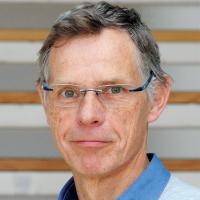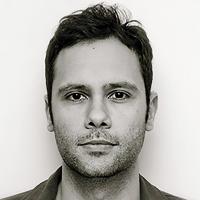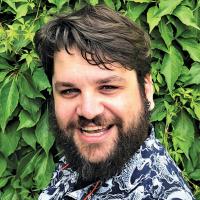
Bernd Rosslenbroich
Evolutionary Origins and Transitions of Agency
Features of autonomy in human evolution
Subaward Principal Investigator
Witten/Herdecke University
Bernd Rosslenbroich is an evolutionary biologist at Witten/Herdecke University, Germany. His general interests are patterns and processes in macroevolution, systems biology, and philosophy of biology and medicine. The approach of his team is to analyze morphological and physiological patterns and trends and then to learn about underlying processes. He is especially interested in organismic concepts of biology which take due account of the specific characteristics of the organism. Further he is interested in general zoology and watching nature (including birding) in field trips and on journeys for example to Northern Europe, Africa and Malaysia.
Books:
Rosslenbroich B (2014): On the Origin of Autonomy. A New Look at the Major Transitions in Evolution. Springer Cham, Heidelberg, New York, Dordrecht, London
Rosslenbroich B: Properties of Life – Towards a Theory of Organismic Biology (book manuscript, currently under review)

Sahotra Sarkar
Agency and Directionality in Development
Cellular agency in multicellular development and cancer
University of Texas at Austin
Sahotra Sarkar is Professor of Philosophy and of Integrative Biology at the University of Texas at Austin.

Martijn Schenkel
Modeling Agency Formally
The paradox of the organism
Georgetown University
Martijn Schenkel is an evolutionary biologist who is interested in how conflict between different entities drives evolutionary change, and how evolution is affected by the fundamental properties of biological systems such as its mechanisms of inheritance and reproduction. His work uses theoretical approaches, supplemented with empirical work, to investigate the evolutionary dynamics of different genetic systems. He completed his PhD on the evolutionary dynamics and genetics of sex determination transitions at the University of Groningen, the Netherlands.

Armin Schulz
Modeling Agency Formally
Cluster Coordinator
University of Kansas
Armin Schulz is an interdisciplinary researcher investigating what we can learn from linking evolutionary biology and the cognitive and social sciences. His particular focus is on the evolutionary pressures on representational decision-making, both with a view towards cognitive psychology and economics. He is the author of two books (“Structure, Evidence, and Heuristic: Evolutionary Biology, Economics, and the Philosophy of Their Relationship, Routledge, 2020, and "Efficient Cognition: The Evolution of Representational Decision Making," MIT Press, 2018) as well as over 20 papers in the leading journals in the field.
He has presented his research in many parts of the world, and has experience in engaging with non-professional audiences through interviews at National Public Radio and articles in Aeon magazine (among others). He regularly teaches classes in cognitive science, philosophy of social science, and philosophy of science.
In his free time, he likes to spend time with his family and friends, play and listen to music, and run.

Emiliano Sfara
Higher-Level Agency and Directionality in Ecology and Earth Science
An organizational account of ecological functions
I’m an Italian postdoctoral researcher at the University of São Paulo, Brazil, since 2018. My main research interests focus on the influences of Kant’s ideas of organism in Georges Canguilhem’s philosophy of medicine and biology. The theoretical interconnections between philosophy of science, philosophy of action and philosophy of artistic creation in Canguilhem’s thought oriented my previous doctoral and postdoctoral investigations in France (IHPST of Paris, Université Montpellier 3), Italy (Università della Calabria) and Canada (CIRST, Université du Québec à Montréal). The application, from an organizational perspective, of the concepts of normal and pathological to ecosystems will be one of the most relevant research topics for me in the years to come.

Ruth Shaw’s research focuses on evolutionary processes in wild plant populations using quantitative genetics and population biology. With collaborators, she has addressed questions concerning effects of new mutations on plant fitness, the pace of evolutionary adaptation to changing climate, and evolutionary consequences of severe fragmentation of prairie. Current research is assessing the rate of adaptation of populations to ascertain whether adaptation will suffice, over the near term, to maintain populations. Shaw was raised with five siblings near Philadelphia PA. She graduated from Oberlin College, earning her B.A. in Biology, and then earned her Ph.D. in Botany and Genetics at Duke University. After a postdoc at University of Washington, she joined the faculty at University of California, Riverside and moved to the University of Minnesota in 1993. She has served as Editor in Chief of Evolution and President of the Society for the Study of Evolution.

Graham Shields
Higher-Level Agency and Directionality in Ecology and Earth Science
Chance versus purpose in biosphere evolution
University College London
Graham Shields is Professor of Chemical Geology at University College London. He received his PhD from the ETH Zurich in 1997 on the chemical and isotopic evolution of the oceans during the Ediacaran through Cambrian bioradiations when animals first diversified into shelled and muscular forms. Since that time he has worked in France, Canada, Australia, Germany and China as well as the UK on diverse aspects of Earth history and sedimentary geochemistry. Currently, his research group at UCL explores how life and its physical environment have co-evolved through geological time. Graham is the scientific coordinator of a joint UKRI-NSFC programme on Biosphere Evolution, Transitions and Resilience (BETR) and chair of the Earth System Science group of the Geological Society of London.

Derek Skillings
Agential Behavior and Plasticity in Evolution
Directedness in holobiont systems
Subaward Principal Investigator
Derek Skillings is an Assistant Professor in the Philosophy Department at the University of North Carolina at Greensboro. He specializes in the philosophy of biology, philosophy of science, marine phylogeography and evolutionary ecology. He works primarily on biological individuality and explanation and causal reasoning in biology. He is particularly interested in the problem of how to approach the complex and hierarchical nature of living systems when investigating biological phenomena and constructing explanations.
